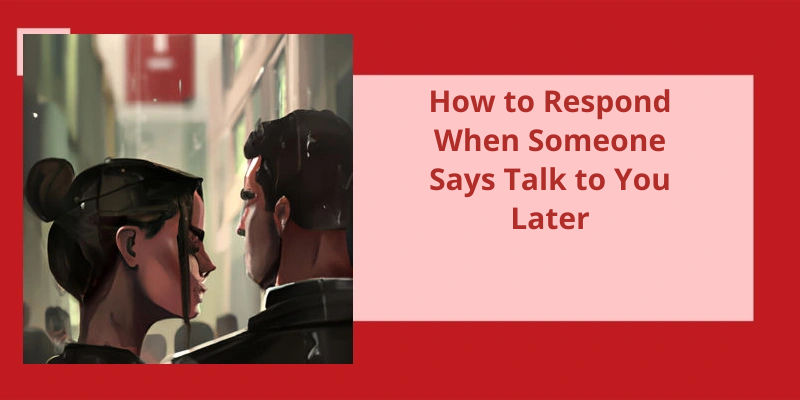Some people might simply say "ok" or "sounds good," while others might offer a specific time or date to reconnect. Ultimately, the way you respond will depend on a variety of factors, including your relationship with the person, the context of the conversation, and your own personal preferences. Whether you choose to be direct or more casual in your response, the most important thing is to be mindful of the other person's needs and feelings and to communicate in a way that’s respectful and clear. So the next time someone tells you to "talk to you later," take a moment to think about what they might mean and how you can respond in a way that supports your ongoing relationship.
How Do You Answer Can We Talk Later?
It’s important to acknowledge their request and validate their need for space or time. However, it’s also important to make sure they know that you’re there for them whenever they need you. This response shows that you’re respecting their boundaries while still being supportive and available.
Another way to respond is to ask when would be a good time to talk. This not only shows that you’re willing to make time for them but also allows them to set their own timeline for when they’re ready to talk. It’s important to be flexible and understanding of their needs, as everyones communication styles and comfort levels differ.
It’s also important to communicate your own needs and boundaries in response to their request. Let them know if there’s a specific time or day that works best for you or if you also need some space to process things before having a conversation. Creating a safe and open dialogue helps to establish healthy communication habits.
If the request to talk later comes in the midst of a disagreement or conflict, it’s important to make sure that both parties have a clear understanding of what exactly needs to be discussed and resolved. Agreeing on an agenda or outline for the conversation can help ensure that both parties are listened to and heard, and that the conversation stays on track and productive.
However you choose to respond, it’s important to approach the situation with empathy and understanding. Often, when someone asks to talk later, it’s because they’re feeling overwhelmed or need time to process their thoughts and emotions. By respecting their boundaries while still remaining available and supportive, you can help create an environment that encourages healthy communication and positive relationships.
How to Set Boundaries When Someone Asks to Talk Later.
- Decide if you want to talk later or not.
- Communicate your decision clearly and assertively.
- Be honest about your availability and willingness to engage in conversation.
- Stick to your decision and don’t feel guilty or obligated to change it.
- Suggest a specific time or alternative if you’re willing to talk later.
- Practice self-care and prioritize your own needs in the situation.
- Remember that setting boundaries is healthy and important for maintaining positive relationships.
Now that we understand what “talk to you later” means in texting, it’s important to know how to interpret this common phrase in different situations. Is it a casual goodbye or a subtle indication that the conversation isn’t over? Let’s take a closer look and explore the nuances of this phrase.
What Does Talk Later Mean in Texting?
Furthermore, the phrase “talk to you later” in texting is often used as a polite way of saying goodbye, rather than indicating an actual intention to engage in conversation with the recipient at a later time. It’s a common and informal way of ending a text conversation without leaving the other person hanging.
It’s a way of postponing the discussion or leaving it open for further exploration at a later time. It’s important to note that this phrase should be taken at face value, and not as a guarantee of an eventual conversation.
If someone consistently ends texts with this phrase without following up, it can be a sign that they aren’t interested in continuing the conversation or pursuing the relationship further. However, it’s important to remember that not everyone communicates in the same way, and this may not always be the case.
It can be a friendly way of saying goodbye, a postponement of a discussion, or a sign of disinterest. As with all forms of communication, it’s important to consider the tone and intention behind the words, rather than relying solely on their literal meaning.
Now that we’ve established what it means when someone says “talk to you soon”, let’s delve into the different social cues and connotations that this phrase might carry depending on the context of the conversation.
What Does It Mean When Someone Says Talk to You Soon?
The phrase “talk to you soon” could also be a polite way of indicating that the conversation has come to an end. It could be seen as a way to wrap up a conversation without causing any offence. It’s often used in casual settings, between friends and family members. In these contexts, the phrase can convey a sense of warmth and intimacy, suggesting that the speaker is keen to continue talking with the other person.
However, when used in a professional context, the phrase might have a different meaning. This could be interpreted as a lack of interest or engagement, and might cause the other party to feel undervalued or overlooked.
It could signify a sincere desire to continue communicating, or simply a polite way to end a conversation. The tone of the conversation, the relationship between the speakers, and the circumstances surrounding the conversation can all influence the meaning behind the phrase.
In these situations, the phrase could be interpreted as an invitation to continue the conversation at a later time or date. For example, if someone says “talk to you soon” after discussing a potential business opportunity, it could suggest that they’re keen to follow up and continue the discussion in due course.
It can mean different things to different people, depending on the context and the relationship between the speakers. Some people might use the phrase more liberally than others, indicating their desire to maintain contact and continue conversations on a regular basis, while others might use it sparingly, only when they’ve a specific purpose in mind.
Effective communication skills are essential in every aspect of life, especially in the workplace. Knowing how to politely decline a conversation or postpone it’s one of the most important skills to master. In this article, we will explore different ways to tell someone that you need to talk later without offending them.
How Do You Tell Someone We Will Talk Later?
It’s important to maintain healthy communication with the people around us, but sometimes our schedules may not allow for immediate conversations. In those cases, it’s necessary to convey the message that we will talk later. There are several ways to go about this without offending the other person.
One approach is to express your excitement about the conversation but let them know that you’re currently busy. This shows that you value their input and want to take the time to engage in a meaningful conversation, but that it may not be possible at the present moment. It’s also important to give them a timeframe of when you’ll be available to talk.
Another option is to be honest and direct. You can simply say that you aren’t available to talk right now and that you’ll have to reschedule for a later time. This approach may work best with close friends or family who understand and respect your schedule.
If you’re in a professional setting, it may be appropriate to set a specific time for when you can talk in the future. This shows your colleagues or clients that you prioritize communication, but also have other important responsibilities to tend to. This can help you maintain a positive work relationship while also keeping organized.
It’s important to remember that saying you’ll talk later can come off as dismissive if the other person is looking for an immediate response. If possible, try to provide a reason for why you can’t talk at the moment. This can also help reduce any confusion or frustration about the delay in communication.
Overall, it’s important to communicate effectively so that relationships can remain strong and both parties can feel valued. By being honest, direct, and providing a timeframe of when you’ll be available, you can convey your message in a respectful and understanding way. The key is to find the right balance between maintaining communication and respecting your own schedule.
What Does It Mean When Someone Says I’ll Talk at You Later?
Pressing the intent to speak with someone again in the future. This expression is often used as a farewell when a conversation is ending, and the parties involved are confident they’ll continue it at a later time. The significance of the phrase resonates with a sense of social familiarity, as it’s mostly used among friends and close acquaintances. Although the term “talk” hints at a face-to-face or phone conversation, in modern times, it could also imply text messaging, email, or social media platforms.
The phrase “talk at you later” could be perceived as slightly dismissive if used on a person with whom one doesn’t have a strong rapport. Some people might view it as a way of evading a conversation or ending it abruptly. However, in general, the phrase is innocent and serves as a polite way of indicating that the conversation can’t go on further or that the parties have other obligations to attend to. It also indicates that the conversation has reached a natural conclusion.
The former implies that the speaker will do most of the talking during the future conversation and the recipient will be on the listening end. It might denote that the speaker has a lot to say or is enthusiastic about the topic and can hardly wait for the next conversation. On the other hand, “talk to you later” doesn’t convey who’ll be the primary speaker in the conversation, and both parties may share equal amounts of information.
In some cultures, such as Latin American and Middle Eastern cultures, conversational etiquette demands that a conversation be extended beyond an immediate dialogue, and the parties must explicitly express their willingness to talk later. Failure to adhere to this might signify a lack of interest or respect for the other person. Conversely, in some Asian cultures, ending a conversation with a verbal guarantee of meeting soon could be considered blunt and awkward as it’s expected that the other person is inherently aware of the desire to meet again.
It’s utilization suggests that the conversation has reached a natural conclusion or that the parties have other obligations to attend to. However, it could also mean that the speaker will do most of the talking during the next conversation. The significance of the phrase might differ from one cultural setting to another.
Variations of the Phrase “Talk at You Later” in Different Languages and Cultures
This article explores how the phrase “talk at you later” is expressed in various languages and cultures around the world. It highlights the unique variations and nuances of communication among different communities and provides insights into cross-cultural communication.
Source: Why do people say ‘I’ll talk at you later’? Shouldn’t it be … – Quora
Conclusion
It’s important to acknowledge their statement and show that you value their time and communication. You can respond with a simple "sure" or "okay" if it's a casual conversation, or with a more sincere reply if it’s a significant conversation that requires further discussion. Keep in mind that even if you can’t talk at that moment, it's essential to make sure that the other person feels heard and respected. Ultimately, clear and effective communication is key to maintaining healthy relationships.






